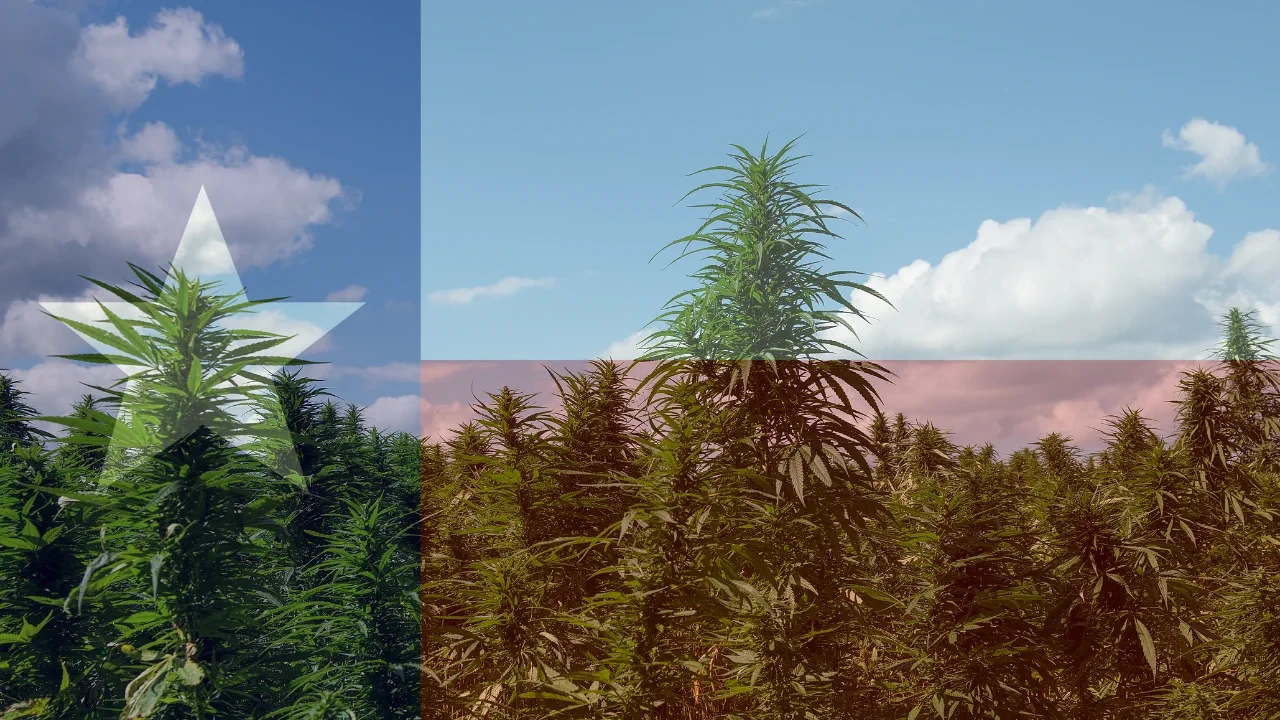With the recent boom in cannabis production and consumption across the United States, we take a look at the state of Texas. The largest state after Alaska tends to veer towards conservative values that are severe on drug use and possession.
While liberal outliers like Austin have changed local policy to reduce prosecution, the state at large has harsh weed laws.
That may all change as many other states begin to pass successful legalization legislation through 2021 (Connecticut, New Mexico, New York, and Virginia), but for now, this article provides a breakdown of how, where, and when to grow in Texas, and what the law says.
Growing Weed Outdoors in Texas
Texas' warm, dry climate is great for growing weed, but location is key in this massive state. The Gulf has higher humidity, while the north sees late frosts, especially in cities like Dallas.
Plant strains in March or April to dodge frost and avoid the scorching heat of summer, which can exceed 85°F (30°C) and stunt growth. Early planting also reduces the risk of September storms wrecking crops.
Choose a spot with at least 6 hours of daily sunlight—midday light is ideal—and ensure a good water supply, like collected rainwater. In flat areas like the Great Plains, consider windbreaks for added protection.
Best strains to grow in Texas
When it comes to picking a strain, there are countless options available. Indicas do fine across the state, but tropical-originating sativa seed strains do best in warmer climates.
If you’re nearer the Gulf coast, Sativas like Acapulco Gold, which originated in neighboring Mexico, are perfect. Classics like Purple Haze, Blue Dream, Island Sweet Skunk, and Berner's Cookies, too, are ideal in Texas growing conditions.
Texas weed laws
Texas has strict cannabis laws. Although Texas doesn't have any specific penalties for cannabis cultivation, you can be harshly prosecuted for possession. These laws kick in at two ounces.
As most single plants weigh more than this, you can technically expect a felony charge for possession that can result in a $2,000 fine and up to 180 days in jail. These charges increase based on the amount of cannabis possessed and are found in the Texas Health and Safety Code, Chapter 481.
Texas laws have always been among the country’s most severe. Before 1973, simple possession of any amount of marijuana resulted in mandatory jail time. While proposals for legalization failed in 2015, medical use was legalized (although with much greater limitations than in other states).
Since 2020, some cities like Austin have effectively stopped making arrests for possession of small quantities of cannabis, although it is technically still illegal. As such, it’s effectively illegal to cultivate marijuana, with some caveats in local areas.
Given the punitive cannabis laws still in Texas, it’s important that you grow discreetly and in very low quantities so as not to run afoul of the law. The less you grow, the lower the punishment.
Alternatively, wait for the laws to change as public opinions sway more in its favor. While there is no sign that Texas’ current lieutenant governor, Dan Patrick, will pass any legislation (he consistently blocks any such bill), baby steps are taken every year.
Is weed legal in Texas, 2020 - 2021, or decriminalized?
No. Weed is illegal, and it’s still prosecutable to own and grow. Change is afoot, however, as the Texas House of Representatives voted to make possession of up to an ounce of cannabis a class C misdemeanor in April 2021.
That means small levels of possession will not involve incarceration and are instead subject to a $500 fine.
The following cities and counties have taken their first steps toward decriminalization by preventing arrests for those in possession of small quantities (usually 2 to 4 ounces, depending on the area) or operating a cite-and-release policy with no jail time:
- Austin
- Bexar County
- Cedar Park
- Dallas County
- El Paso County
- Harris County
- Hays County
- Nueces
- Travis County
- Williamson County
Austin has taken one of the strongest stances in banning the use of city money in prosecuting non-felony cases. This essentially decriminalizes possession of under 4 ounces.

Will Texas ever legalize (recreational) weed?
Weed policy in Texas gets more complicated every year. As of 2021, Texas is among 13 states in which recreational use is illegal.
Change is happening, however, and the successes of states like Washington, Colorado, and California are being used to advocate for relaxation in the future. Penalties are resulting from minor possessions, and endorsements for decriminalization and legalization are growing.
In short, the state gets one step closer to legalization with every new House Bill.
Another aspect to consider for future legalization is on a federal level. The United States gets closer to full federal legalization every year, too. New draft legislation is looking to remove all federal penalties for cannabis possession and to expunge criminal records for nonviolent offenders.
This won't immediately change Texas law if passed, as states can choose not to opt in. However, states will likely be pushed toward greater legalization if such a bill is signed into law.
That’s because marijuana has essentially become a huge economic boon in legalized states, and with federal legalization, transport between states and taxation will lure states like Texas to amend the law.
Penalties
As there are no specific laws for cultivation, we have to look at possession for accurate penalties in state law. If found growing marijuana, for instance, you’d be charged via possession laws based on how much measurable marijuana is found.
- Possession of 2 oz or less, the charge is a misdemeanor with up to 180 days in jail and a $2,000 fine.
- Possession of 2 - 4 oz, the charge is a misdemeanor with up to 1 year in jail and a $4,000 fine.
- Possession of 4 oz to 5 lbs, the charge is a felony with up to 2 years in jail and a $10,000 fine.
- Possession of 5 to 50 lbs, the charge is a felony with up to 10 years in jail and a $10,000 fine.
- Possession of 50 to 2000 lbs, the charge is a felony with up to 20 years in jail and a $10,000 fine.
- Possession of over 2000 lbs, the charge is a felony with up to 99 years in jail and a $50,000 fine.
Laws for selling cannabis are even more severe. It isn’t, however, illegal to purchase seeds. There is, after all, no THC present in seeds.
Texas medical cannabis
While recreational cannabis laws in Texas are clear: it is illegal, there are some differences in medical law. Put simply, Texas is one of the most restrictive states in the USA, as it only allows low-THC strains for medical use.
It must be prescribed by a qualified medical practitioner for a set number of conditions only, as we’ll explain below.
Is it legal to grow (medical) marijuana in Texas?
Not really. Medical marijuana is technically legal in Texas. However, there are many restrictions on what qualifies as medical marijuana and what it can be used for.
Medical cannabis must contain up to just 1% THC by weight and can only be picked up from a licensed dispensary under prescription. This was updated in 2021, as previous iterations of the law allowed only 0.5% THC.
Anything below 0.5% is considered hemp by the state of Texas and is completely legal anyway. As such, there is very little difference between the hemp allowed in the state, like CBD oil, and the marijuana classified as medical.
On top of the restrictions on potency, medical marijuana can only be prescribed for the following conditions:
- Amyotrophic Lateral Sclerosis
- Autism
- Cancer
- Epilepsy and other seizure disorders
- Incurable neurodegenerative disease
- Multiple Sclerosis
- PTSD
- Spasticity
While these qualifying and potency conditions are among the most restrictive, there is no real capability to measure substance strength. What's more, there is no age limit for a prescription.
However, medical use cannot be smoked and is limited to swallowing only. As such, cannabis is largely prescribed as oil for oral use.
Do I need a license or medical card?
There is no medical marijuana card or similar system in Texas. First legalized in 2017, it has expanded over the years to include use for a wide number of symptoms. Rather than being prescribed using a card, you simply receive medical marijuana like traditional medicine.
The prescription from your medical provider is the only thing you need. Once you’ve received your prescription, these can also be renewed by your doctor or physician.
How to apply for medical marijuana in Texas?
To apply for medical marijuana, you first must be a permanent resident of Texas. You also must meet the criteria and be suffering from the aforementioned conditions. Simply see a CUP-registered physician (CUP stands for Texas' Compassionate Use Program) for a prescription.
You can then take your prescription note over to a designated dispensary to pick up your dosage.
If you are under 18 years of age, you must attend your physician appointment with a legal guardian. Remember, even though it’s legal to consume marijuana recreationally and medically in other states, including neighboring New Mexico, you can’t bring marijuana back with you.
That would count as drug trafficking, a serious offense in Texas.
Grow Weed in Texas with Cannabis Seeds from Weedseedsexpress
Texas may be known for the liberal values of cities like Austin, but the state as a whole is harsh when it comes to cannabis laws. You’ll have to balance the pros and cons if you decide to grow in the state.
While, for now, growing is an illegal practice, there are signs that change is happening slowly. You may not have the freedoms recently granted to neighbors like New Mexico and trailblazers like Oregon, but there’s still an appetite for legalization amid ongoing decriminalization across the state.
If you’re looking for high-quality seeds with excellent germination rates and superior genetics, head to our cannabis seeds overview. You’ll find a wide range of excellent options that are suited to Texas’ hot and sunny climate.
From thriving outdoor Sativas that will love the abundant natural light to discreet indoor Indicas, you can choose from modern masterpieces and old-school classics.





